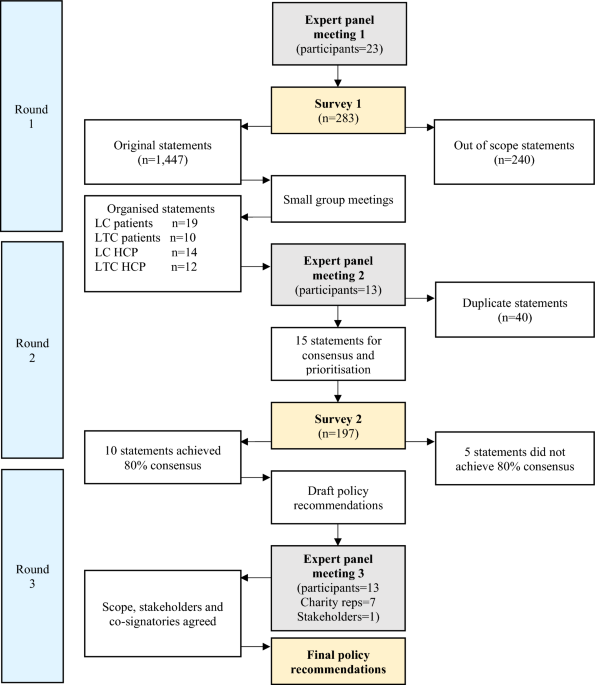Designing Integrated Care: Insights from a Delphi Consensus Study
In a small conference room at the University of York, a diverse panel of healthcare professionals and patients gathered for a pivotal moment in healthcare design. They were drawn together by a pressing challenge: how to effectively address the needs of individuals suffering from complex long-term conditions, including Long COVID. Among them was Dr. Lisa Harrington, a general practitioner who vividly described her frustration with the current healthcare system—”We need to shift from reactive care to proactive strategies, especially for conditions that are poorly understood,” she asserted.
The Delphi Method: A Framework for Collaboration
The heart of this initiative lies in a modified Delphi method first established in the 1950s. The current project utilized a variation known as the estimate-talk-estimate method, which fosters anonymous expert opinion gathering followed by open discussions during facilitated workshops. Over a year-long period from February 2022 to March 2023, two comprehensive surveys and multiple panel meetings were conducted. Their aim? To identify the integrated care priorities essential for effective healthcare delivery. Notably, findings were meticulously documented in accordance with the Guidance on Conducting and Reporting Delphi Studies (CREDES).
Scope of the Study
At the inaugural meeting, expert panel members outlined the scope of the study, which focuses on adults (aged 18 and older) residing in the UK. The project received valuable insights from the STIMULATE-ICP Patient and Public Involvement (PPI) group. They emphasized the importance of addressing fatigue as a significant symptom across various conditions. However, a contentious issue remained: whether Long COVID should be categorized alongside myalgic encephalomyelitis or chronic fatigue syndrome (ME/CFS). Ultimately, the decision was made to focus specifically on Long COVID.
The Delphi Team’s Composition
This ambitious initiative involved a multifaceted team:
-
Research Team: Consisting of academic researchers and a coordinator, their collective expertise spanned various domains of public health.
-
Moderator Panel: Included general practitioners and PPI members, who coordinated interaction between the research team and the expert panels to ensure alignment throughout the project.
-
Expert Panel: This diverse group included healthcare providers and patients, selected through snowball sampling, representing various long-term conditions.
Data Collection and Analysis
The first phase involved collecting anonymous data via an online survey platform, Qualtrics. Participants were asked to provide information across a range of factors, including demographics and experiences related to their conditions. Dr. Ethan Miles, a psychiatrist on the expert panel, remarked, “Understanding these lived experiences is crucial. It shapes our clinical approaches and helps inform better health policies.”
Round 1: Gathering Information
With a total of 283 respondents, the survey generated 1,447 individual suggestions. The research team categorized these responses based on whether they originated from patients or healthcare professionals. This organization was essential for developing a broad understanding of the shared challenges in managing Long COVID and other long-term conditions.
Round 2: Establishing Consensus and Ranking
The second survey sought to achieve consensus on the statements derived from the first round. Utilizing a 5-point Likert scale, experts ranked these statements based on perceived importance. The goal was to distill this input into a prioritized list that reflected the collective wisdom of both patient and healthcare communities. The moderator panel facilitated discussions around these rankings, ensuring that all voices were represented.
Round 3: Developing Policy Recommendations
Coming to a critical juncture, the team identified ten statements achieving an 80% consensus. These statements formed the basis for draft policy recommendations, organized into four key domains: Diagnosis, Research, Resources, and Training. Dr. Angela Thompson, a leading researcher in chronic conditions, noted, “These recommendations are not just for policymakers; they are a roadmap for future research and healthcare practice.”
Survey Participant Diversity
Utilizing snowball sampling, both surveys aimed to ensure a diverse participant pool, incorporating both clinical and lived experiences. The final cohort demonstrated a broad range of age, gender, and ethnic backgrounds, aiding the robustness of the findings. Survey 1 included responses from patients and healthcare professionals, while Survey 2 refined these insights further, focusing on consensus and priorities.
Patient and Public Involvement (PPI)
At every stage, the involvement of patients was integral. Their insights not only shaped the study’s design but also influenced the final recommendations. PPI members contributed perspectives that bridged the gap between clinical expertise and lived experiences, affirming the importance of collaborative healthcare design.
Ethical Considerations
This research adhered to the Declaration of Helsinki and received approval from the University of York Health Sciences Research Governance Committee. Each participant provided informed consent, ensuring ethical integrity throughout the research process.
The culmination of this Delphi consensus study offers valuable insights into effective integrated care for Long COVID and other long-term conditions. The collaborative effort reflects a significant step forward in addressing the complex needs of affected individuals. As Dr. Harrington poignantly stated, “This is more than research—it’s a call to action to reshape our healthcare system for the better.”
Source: www.nature.com


